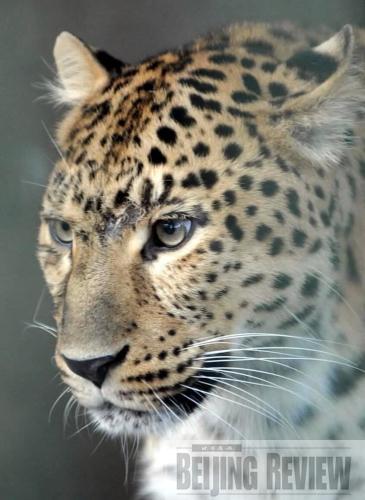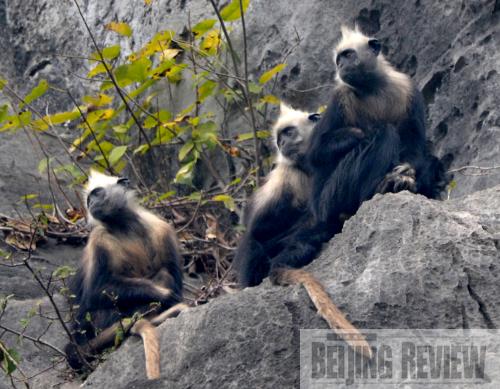|
 |
|
Leopard, representative animal for Shanxi Province (ZHU XIANG) |
The rapid change of the global climate is also seriously impacting China's natural ecosystems and biodiversity. The Intergovernmental Panel on Climate Change, a scientific body tasked to evaluate the dangers of human-induced climate change, estimated that 20 percent to 30 percent of the species would face extinction if the temperature rises 1.5-2.5 degrees centigrade.
According to China's National Assessment Report on Climate Change, a comprehensive review compiled by multiple departments and experts, the country saw a 1.1 degree centigrade increase in temperature over the last 50 years, breaking down to a 0.22 degree centigrade increase every decade and surpassing the speed of the global temperature increase.
The latest edition of Red Book of Endangered Species in China reported that the country has a large proportion of at-risk wildlife on the Red List of Threatened Species of the International Union for Conservation of Nature—35 percent of invertebrates, 36 percent of vertebrates, 70 percent of gymnosperm plants and 87 percent of angiosperms are endangered.
Scientists have become increasingly aware that the rapid loss of biodiversity not only affects genes, species and ecology, but also damages the diversity of the human culture and its unique structure.
In China there are more than 200 endangered wild animals and thousands of rare wild plants that have been saved from extinction by groups that have established artificial propagation programs for these species, of which some have returned to the wild.
The 23rd International Congress for Conservation Biology also has information showing that China now has 6,500 vertebrates and 30,000 higher plants, accounting for 14 percent and 10 percent of the world's species, respectively. Such rare and endangered wild animals as the giant panda, the crested Ibis and the golden monkey are unique to the country.
"The protected species in the country have enjoyed a good environment for survival and a stable population. But those not receiving good protection are suffering from a sharp decrease in population numbers," said Xie, adding that humans have little knowledge about many species and often have no idea which need to be protected.
"It takes great effort and investment to protect some of the species that have greater needs from the environment. We hope to call for more attention and care for them via issuing 'biological cards,'" Xie said.
Statistics from the conservation biology meeting showed that there are 3,000 civilian organizations on environmental and biodiversity protection in China, while full-time employees of 40 percent of these organizations receive no payment. Such volunteers who work out of a sense of commitment are common on the environmental battlefield.
Many Chinese experts have worked on biodiversity protection besides their daily research work. They play a large role in protecting such rare animals as the giant panda, the Tibetan antelope and the Chinese river dolphin. More scientific projects and students are being drawn into the field of biodiversity protection as well.
"'Biological cards' won't remain unchanged for good and it will be re-selected in five or 10 years to reflect upcoming new species and to keep up a continuous awareness on the issue of biodiversity protection," said Xie.
 |
|
Magmolia, representative plant for Shanghai (LIU YING) |
 |
| Mandarin Duck, representative animal for Hebei Province (QIN GANG) |
 |
| Giant Panda, representative animal for Sichuan Province |
 |
| Presbytis Leucocephalus, representative animal for Guangxi Zhuang Autonomous Region (ZHOU HUA) | | 